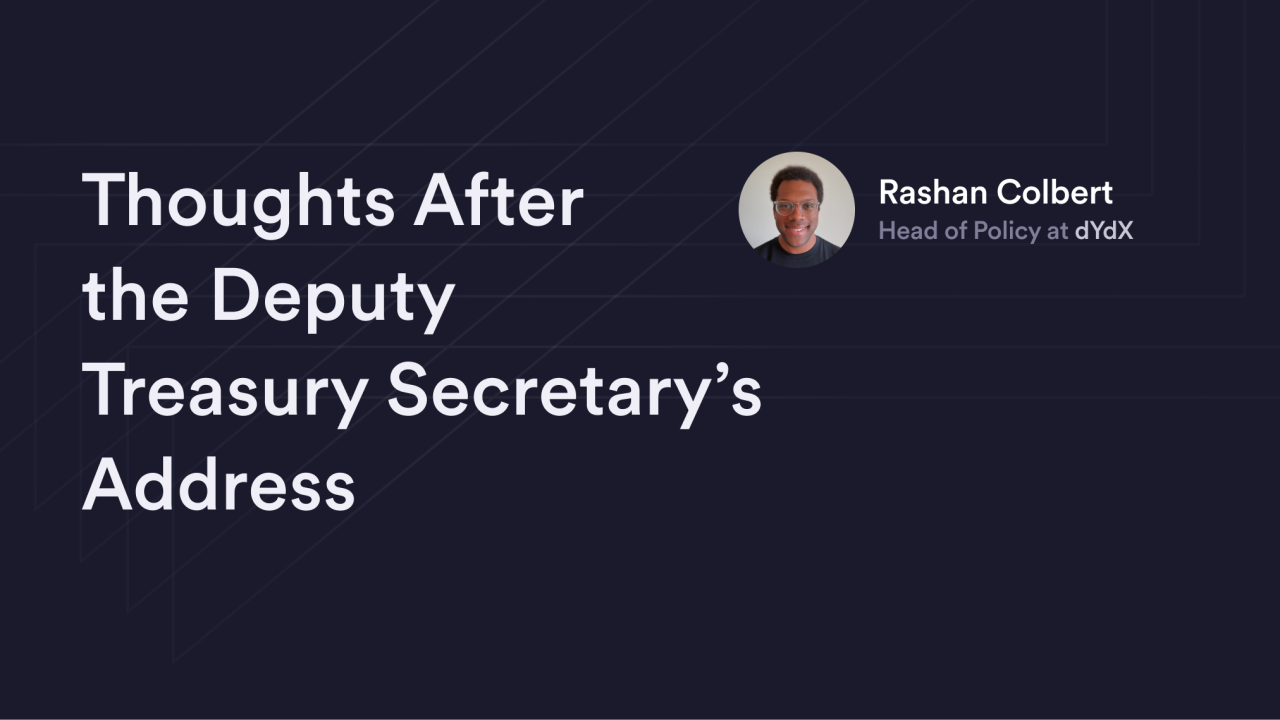


At the 2023 Blockchain Association Policy Summit in Washington, DC, the Deputy Secretary of the Treasury, Wally Adeyamo, delivered a powerful message to the crypto community about the need for further regulation.This speech marked phase two of a three part strategy to bring the hammer down on the industry by 2025.
What is the industry going to do?
A Repeated Request for Action
In the speech, Deputy Secretary Adeyemo laid out the case that the crypto industry is not in good standing with the law and has been negligent to past calls for reform.
“Today I would like to focus on the steps we must now take in order to prevent bad actors from using the digital asset ecosystem for illicit activity. I want to directly address those within the digital asset industry who believe they are above the law. [...] My message is simple: We will find you and hold you accountable.”
Repeatedly, the Deputy Secretary referred to his speech last year at Consensus 2022. His message was essentially the same as this year’s. At Consensus he said: “In many cases, […] proactive, self-regulation will be necessary. Let me be clear: When digital asset companies and exchanges allow bad actors to remain a part of this ecosystem or take advantage of vulnerable consumers, they risk harming the reputation of your firms and your industry. And they heighten the impetus for strict regulation.”
Strict Regulation
The “strict regulation” referred to in that speech came in the form of a proposal to Congress that Treasury released, via memo, the night before the Blockchain Association appearance. In the memo Treasury asks for expanded powers to police crypto through two broad requests: (1) by the creation of a new sanctions tool; (2) legislation to close so-called gaps in Treasury’s authority to regulate crypto-industry participants under the BSA (Bank Secrecy Act) and IEEPA (International Emergency Economic Powers Act).
The memo suggests that Treasury’s BSA and sanctions authorities are not in a position to adequately ensure that “our AML/CFT regime can best deter, detect, and stop illicit finance facilitated by virtual assets.” The document goes on to detail several legislative proposals, the majority of which are overly broad, particularly as they relate to DeFi. The proposals additionally serve to push the development of crypto offshore, working against the goal to “deter, detect, and stop illicit finance facilitated by virtual assets,” as stated in the memo, as well as hurt U.S. investors and consumers. Treasury’s goal to reduce the use of digital assets by bad actors is laudable, but its solution seems to be to “throw the baby out with the bathwater.”
Shoehorning DeFi into a regulatory regime designed decades ago for centralized financial institutions, becomes fundamentally unworkable for most decentralized industry participants. Centralized entities that are already covered by the BSA, because they do things like custody customer funds, are in a position to adhere to the BSA’s requirements. Expanding the universe of covered entities to include all “Virtual Asset Service Providers (VASPs), virtual asset wallet providers, certain blockchain validator nodes, and decentralized finance services” is unreasonable. And requiring these entities to begin collecting the personal information of users is unworkable and potentially dangerous, as it creates many more repositories for sensitive data that bad actors would love to attack.
My Prediction - Three Strikes, You’re Out
The speech at the Blockchain Association Policy Summit was the second of two instances where Deputy Secretary Adeyemo, now the face of the Admin’s crypto initiative, came directly to the industry and asked for it to police itself.
Next year, he’ll come to a third major gathering and say that crypto has failed to act. He’ll say that he gave the crypto industry a chance and we chose not to work with them in order to keep our industry safe. The Administration will then use that moral position to follow up on this year’s proposals with a real legislative plan and potentially more stringent additional points.
What Do We Do Now?
We (the crypto community) have to continue our advocacy to policymakers. Treasury wants to go through Congress to gain additional powers to police crypto. Some people have the idea that legislative action in 2024 is already baked and Congress won’t act on crypto beyond the bills that have already made committee progress. That *might* have been true before this proposal saw the light of day, but this is an evolving situation. A full court press from the Treasury on these proposals is not something we want to go unchecked.
And this one might get me in trouble with some folks in the crypto community: but we have to heed the solicitation from the Deputy Secretary and deliver creative solutions of our own design to policymakers. In the Consensus speech, Deputy Secretary Adeyemo said “We look[ed] forward to working with you [the crypto industry] to build a regulatory architecture that protects the financial system from illicit activity while providing you the support and room you need to continue to innovate.” We don’t have to make suggestions that look like the proposals from Treasury (we know that would kill our industry in the United States), but we can’t afford to stay quiet. Some members have been waiting for clearer guidance from the Administration before making their minds up regarding crypto. As the Administration’s strategy comes into focus, legislator’s opinions will begin to converge without meaningful alternatives.